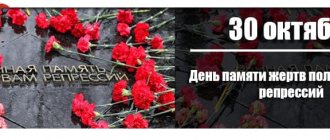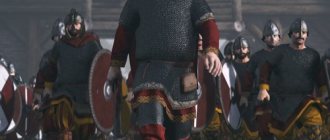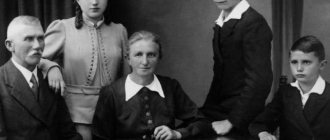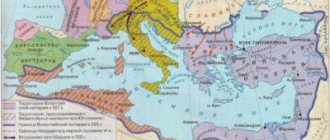Isn't religion the cause of all wars?
Estimated reading time: less than a minute.
We may feel the rightness of our faith, but we cannot always explain or prove it to a non-believer, especially to someone who for some reason is irritated by our worldview.
Reasonable questions from an atheist can baffle even the most sincerely believing Christian. Sergei Khudiev talks about how and what to respond to common arguments from atheists in the project “Dialogue with Atheists: Orthodox Arguments” . Watch the next live broadcast on the “Foma” Facebook page on Tuesdays at 20.00, during which you can ask your questions.
Isn't religion the cause of all wars?
Some wars (though, of course, not all) were fought under religious slogans and between groups professing different religions. We can see this even now - they especially like to remember extremist groups like Daesh (aka ISIS - a terrorist organization banned on the territory of the Russian Federation) and the protracted conflict between Protestants and Catholics in Northern Ireland. Other examples are given - the extremely fierce and devastating Thirty Years' War in Europe in the 17th century, the terrible massacre between Sikhs, Hindus and Muslims that occurred after the British left India, and this enmity continues to flare up in episodic clashes, the massacre in the former Yugoslavia between people practically one language, but different cultures associated with religions - Orthodoxy, Catholicism and Islam, respectively. The examples go on and on, with Dawkins (and other atheist authors) exclaiming that if it weren't for religion, none of this would have happened.
Why is this conclusion grossly incorrect? It represents a fairly typical matching of problem to answer - militant atheists are already convinced that religion is the source of war, and wherever they find war and religion, they postulate that the latter is the cause of the former. And you can find both of them everywhere - alas, people have been fighting throughout their history, and the vast majority of cultures in history are religious. Religiosity is a common property of the human race, such as bipedality. We might as well point out that all wars are fought by two-legged people and declare bipedality to be the cause of wars.
It should be noted that, for example, the classic example of a “religious war” - the Thirty Years' War, if we look at it in more detail, does not look so religious. For example, the Catholic Cardinal Richelieu fought with Catholic Spain - obviously for the sake of the state interests of France, and not for the sake of religion. Acute national conflicts - such as in Northern Ireland or Yugoslavia - are precisely national, not religious. Their participants are not at all interested in theology; traditional religion is, at most, one of the markers that separates “friends” from “enemies.”
Moreover, the twentieth century is a century of wars, unheard of in terms of losses and destruction, which had nothing to do with religion, but were fought between purely secular regimes under the slogans of purely secular ideologies. So the cause of wars is clearly not religion.
But weren’t wars fought—and aren’t they now—under religious slogans?
This is undoubtedly true, and there are many examples of military propaganda actively appealing to religion. But “the slogans under which the war is waged” and “the reasons for the war” are completely different things. From the fact that absolutely any military propaganda since the advent of writing declares the cause of its side to be good and fair, it does not in any way follow that the cause of all wars is kindness and justice. Of course, wars are officially launched to restore trampled justice, protect the oppressed, punish villains, establish peace and order, help victims - that is, for the most noble and sublime motives. (You will laugh, but from the point of view of the ancient Romans, they never launched a single aggressive war in their entire history; they always had good reasons) To believe that these noble motives are the cause of wars would be somewhat naive.
In any society, military propaganda appeals to the values accepted in it - and if the society is religious, then it will appeal to religion. And if not especially, then to human rights, democracy, justice, dignity, freedom and other values that are important to the people to whom it is addressed. This in no way makes these values themselves a source of war.
But, for example, suicide bombers - would they blow themselves up along with innocent people if their religion did not promise them paradise after death?
Alas, they would. History has more than enough examples of people sacrificing themselves for a cause they consider right. Kamikazes, the Japanese suicide pilots of World War II who rammed enemy ships with their one-time-use planes, were not promised a paradise after death. Judging by the surviving evidence, the hope of some kind of afterlife played absolutely no role in their motivation. They longed for a beautiful, in their eyes, death, for the Emperor and Japan, and became deeply depressed if the last flight was for some reason disrupted.
Suicide attacks were widely used by the Chinese during the Sino-Japanese Wars, and by the German Nazis near their end.
Even the practice of suicide bombers itself did not appear in a religious environment. The first bomber of this kind was the Narodnaya Volya member Ignatius Grinevetsky, who on March 1, 1881 exploded a bomb that mortally wounded Tsar Alexander II and himself. In the 1970-80s, explosive belts were actively used by the Tamil Liberation Tigers, a group that professed a purely secular nationalist ideology.
What about the Nazi soldiers whose belt buckles read “God With Us”?
This slogan had nothing to do with Nazism and was on the buckles of German soldiers since 1847 - much like the inscription “God is with us” was on the coat of arms of the Russian Empire. The Nazis simply inherited this traditional uniform element from their predecessors in the German army.
National Socialism itself as a doctrine was irreconcilably hostile to Christianity. As the Chairman of the Nazi “People's Tribunal” Roland Freisler said at the trial of the Christian and anti-fascist Helmut von Moltke: “The mask has been dropped. In only one respect are we and Christianity similar: we demand the whole person.”
So, the cause of wars, at a deep level, is human sin, at a more superficial level, it is a conflict of political or economic interests, and religious slogans are attracted only later.
Did Eastern and Western Christians have different views on war and the use of force?
Western theological thought was significantly influenced by Roman jurisprudence. Based on the teaching of St. Augustine on a just war, she paid main attention to the legal basis for the use of force. According to the teachers and authorities of Western Christianity, those who used weapons without sin were those whose actions complied with the rules of its legal or fair use. Bernard of Clairvaux, in his treatise “The New Army of Christ,” discusses knightly honor, for which killing is sinless and the glory of a Christian is the death of a pagan.
During the era of the Crusades, special military monastic orders were established. The soldiers who went to liberate the lands from the infidels were promised complete forgiveness of sins. The original Augustine theses formed the basis of the theory of the “cross and sword” - a medieval doctrine of Catholicism that justified the concentration of power and strength in the hands of the Pope. The teachers of the Reformation were often no less severe.
In comparison, the romanticization of weapons was alien to Eastern Christianity. In the 10th century, due to the growing military threats, Emperor Nikephoros Phocas set out to pass a law on canonizing soldiers who died in battle and forced the hierarchs to accept this as a dogma. But the Church resisted and kept the emperor from his intention.
The 3rd Rule of the Holy Apostles and the 7th Rule of the IV Ecumenical Council prohibit monastics and persons holding holy orders from entering military service. Murder outside military conditions is unconditionally condemned. From St. Basil: “Those who enter into battle with robbers, if they are not among the ministers of the Church, should not be allowed to receive communion, but if they are members of the clergy, let them be deposed from their rank.”
The attitude towards murder remains very strict to this day. Even the accidental deprivation of life or shedding of blood caused by a person in the priesthood entails proceedings in a church court and, quite possibly, a ban on ministry.
Question 6
What factors can serve as an impetus for the start of a “war of religions”
The desire of the people to gain autonomy based on differences in religions. In this case, religion is a kind of generator that fuels the desire to form a new national state.
A unifying religious war, which is based on the desire of people scattered across different countries to reunite. At the same time, a divided people professes a religion that differs from the generally accepted religion in the state where they live.
Communal or internal religious conflicts that occur within one state between different sects within the same religion. These days, such confrontations between Sunnis and Shiites are happening throughout the Middle East.
Religious-absolutist conflicts arise in countries where, on the basis of the propaganda of one religion, intolerance towards representatives of another religion is manifested.
An indicative example of how one thoughtless provocative action on religious grounds can lead to the death of people. American pastor Terry Jones staged a Koran burning event, which caused mass attacks on employees of international organizations in Afghanistan. The pastor himself got off with a small fine, but the result of his action was the death of innocent people.
Who are the “holy warriors” and why are they revered in the Orthodox tradition?
The name “holy warriors” in the Orthodox tradition means professional affiliation. It is assigned to those who in their worldly life were involved in military affairs, but subsequently showed moral perfection in monastic work, in martyrdom for Christ and other rites of holiness that have no connection with war. Images on the icons of weapons, shields and armor should not be misleading. The basis for the canonization of saints in the Orthodox Church are feats and virtues of a peaceful nature.
A special category is formed by holy noble princes. They all fought, and with some convention they can be taken as exponents of the image of a strong hand. However, calling them faithful does not refer to military glory, but to merit in preserving and strengthening the faith. On the historical path of Christian peoples, some played an outstanding role as educators and baptists of new lands, for which they are called Equal-to-the-Apostles, while others, pious rulers, ensured the continuity of this choice at difficult turning points of eras.
We honor Saints Alexander Nevsky, Daniel of Moscow, Demetrius Donskoy and others for this, while others, in the opinion of some, more successful and brave military leaders, leaders and monarchs who contributed to the political or diplomatic rise of the state, are not awarded the honors of glorification.
Question 7
How is the gospel ideal of meekness and gentleness of heart reflected in the church tradition?
The closer a person comes to God, the stricter his moral demands on himself and the less desire to show belligerence and coercion. Resistance by force and participation in wars are the unfortunate fate of those whose faith is weak. Scripture says that by faith the saints accomplished the impossible: they conquered kingdoms... stopped the mouths of lions, quenched the power of fire, escaped the edge of the sword, were strengthened from weakness, were strong in war, drove away foreign armies
(Eur
11
:33–34).
A typical plot should be considered in which the Orthodox ascetic remains resigned in the face of persecutors, softens hearts with his meek disposition, responds with good to the evil done, according to the commandment of Christ: But I say to you: love your enemies, bless those who curse you, do good to those who hate you and pray for those who offend you and persecute you
(Mt.
5
:44).
Question 10
What do the official documents of the Russian Orthodox Church say about war and the use of force?
In 2000, the “Fundamentals of the Social Concept of the Russian Orthodox Church” were adopted - a document that expresses the attitude of our Church to a variety of pressing issues of our time. It states that recently the attitude towards war has been especially difficult to determine: “In the current system of international relations, it is sometimes difficult to distinguish an aggressive war from a defensive one. The line between the first and second is especially thin in cases where one or more states or the world community initiate military action, motivated by the need to protect a people who are victims of aggression.” In this regard, according to the “Fundamentals of the Social Concept,” “the question of the Church’s support or condemnation of military actions requires separate consideration whenever they begin or there is a danger of their beginning. One of the obvious signs by which one can judge the righteousness or injustice of the belligerents is the methods of warfare, as well as the attitude towards prisoners and civilians of the enemy, especially children, women, and the elderly. <…> The most correct assessment of war as a feat or, on the contrary, robbery can be made only based on an analysis of the moral state of the combatants” (VIII, 3).
Andrey Rogozyansky
THOMAS
Excerpt characterizing the Wars of Religion
- I didn’t go in. Where they put it is where it should be. - No... - You just throw it somewhere and forget. Look in your pockets. “No, if only I hadn’t thought about the treasure,” said Rostov, “otherwise I remember what I put in.” Lavrushka rummaged through the entire bed, looked under it, under the table, rummaged through the entire room and stopped in the middle of the room. Denisov silently followed Lavrushka’s movements and, when Lavrushka threw up his hands in surprise, saying that he was nowhere, he looked back at Rostov. - G'ostov, you are not a schoolboy... Rostov felt Denisov's gaze on him, raised his eyes and at the same moment lowered them. All his blood, which was trapped somewhere below his throat, poured into his face and eyes. He couldn't catch his breath. “And there was no one in the room except the lieutenant and yourself.” Here somewhere,” said Lavrushka. “Well, you little doll, move around, look,” Denisov suddenly shouted, turning purple and rushing at the footman with a threatening gesture. - Make sure you have a wallet, otherwise I’ll burn it. I'll kill everyone! Rostov, looking around Denisov, began to button up his jacket, strapped on his saber and put on his cap. “I tell you to have a wallet,” Denisov shouted, shaking the orderly by the shoulders and pushing him against the wall. - Denisov, leave him alone; “I know who took it,” Rostov said, approaching the door and not raising his eyes. Denisov stopped, thought and, apparently understanding what Rostov was hinting at, grabbed his hand. – Gasp! - he shouted so that the veins, like ropes, swelled on his neck and forehead. “I’m telling you, you’re crazy, I won’t allow it.” The wallet is here; I'll take the shit out of this mega-dealer, and it will be here. “I know who took it,” Rostov repeated in a trembling voice and went to the door. “And I’m telling you, don’t you dare do this,” Denisov shouted, rushing to the cadet to hold him back. But Rostov snatched his hand away and with such malice, as if Denisov were his greatest enemy, directly and firmly fixed his eyes on him. - Do you understand what you are saying? - he said in a trembling voice, - there was no one in the room except me. Therefore, if not this, then... He could not finish and ran out of the room. “Oh, what’s wrong with you and with everyone,” were the last words that Rostov heard. Rostov came to Telyanin’s apartment. “The master is not at home, they have left for headquarters,” Telyanin’s orderly told him. - Or what happened? - added the orderly, surprised at the upset face of the cadet. - There is nothing. “We missed it a little,” said the orderly. The headquarters was located three miles from Salzenek. Rostov, without going home, took a horse and rode to headquarters. In the village occupied by the headquarters there was a tavern frequented by officers. Rostov arrived at the tavern; at the porch he saw Telyanin's horse. In the second room of the tavern the lieutenant was sitting with a plate of sausages and a bottle of wine. “Oh, and you’ve stopped by, young man,” he said, smiling and raising his eyebrows high. “Yes,” said Rostov, as if it took a lot of effort to pronounce this word, and sat down at the next table. Both were silent; There were two Germans and one Russian officer sitting in the room. Everyone was silent, and the sounds of knives on plates and the lieutenant’s slurping could be heard. When Telyanin finished breakfast, he took a double wallet out of his pocket, pulled apart the rings with his small white fingers curved upward, took out a gold one and, raising his eyebrows, gave the money to the servant. “Please hurry,” he said. The gold one was new. Rostov stood up and approached Telyanin. “Let me see your wallet,” he said in a quiet, barely audible voice. With darting eyes, but still raised eyebrows, Telyanin handed over the wallet. “Yes, a nice wallet... Yes... yes...” he said and suddenly turned pale. “Look, young man,” he added. Rostov took the wallet in his hands and looked at it, and at the money that was in it, and at Telyanin. The lieutenant looked around, as was his habit, and suddenly seemed to become very cheerful. “If we’re in Vienna, I’ll leave everything there, but now there’s nowhere to put it in these crappy little towns,” he said. - Well, come on, young man, I’ll go. Rostov was silent. - What about you? Should I have breakfast too? “They feed me decently,” Telyanin continued. - Come on. He reached out and grabbed the wallet. Rostov released him. Telyanin took the wallet and began to put it in the pocket of his leggings, and his eyebrows rose casually, and his mouth opened slightly, as if he was saying: “yes, yes, I’m putting my wallet in my pocket, and it’s very simple, and no one cares about it.” . - Well, what, young man? - he said, sighing and looking into Rostov’s eyes from under raised eyebrows. Some kind of light from the eyes, with the speed of an electric spark, ran from Telyanin’s eyes to Rostov’s eyes and back, back and back, all in an instant. “Come here,” Rostov said, grabbing Telyanin by the hand. He almost dragged him to the window. “This is Denisov’s money, you took it...” he whispered in his ear. – What?... What?... How dare you? What?...” said Telyanin. But these words sounded like a plaintive, desperate cry and a plea for forgiveness. As soon as Rostov heard this sound of the voice, a huge stone of doubt fell from his soul. He felt joy and at the same moment he felt sorry for the unfortunate man standing in front of him; but it was necessary to complete the work begun. “People here, God knows what they might think,” Telyanin muttered, grabbing his cap and heading into a small empty room, “we need to explain ourselves...” “I know this, and I will prove it,” said Rostov. “I... Telyanin’s frightened, pale face began to tremble with all its muscles; the eyes were still running, but somewhere below, not rising to Rostov’s face, sobs were heard. “Count!... don’t ruin the young man... this poor money, take it...” He threw it on the table. - My father is an old man, my mother!... Rostov took the money, avoiding Telyanin’s gaze, and, without saying a word, left the room. But he stopped at the door and turned back. “My God,” he said with tears in his eyes, “how could you do this?”










